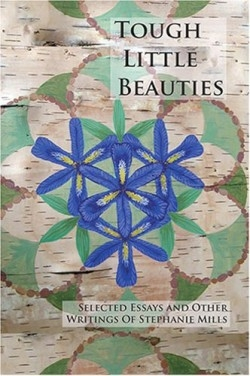Tough Little Beauties
Selected Essays and Other Writings
“The unexamined life may be worth living, but I haven’t much experience with it,” writes Mills in the introduction to her collection of environmentally-themed essays. “I would not care to be without my knowledge of self, nor for that matter, of history, ecology, and place. I am past middle age and beyond despair. I am a pessimist, yet I still do hope.”
Spanning more than thirty years, the essays here range from thoughts about Michigan, Mills’ home, and expand to her travel in India, giving the work both a local and a global flavor. In terms of subject matter, she addresses abortion, oil production, politics, feminism, spiritual life, and globalization. Although she treads wide terrain, her environmentalism provides the thread tying the collection together, and the way she unites self-awareness and reflection with a call to action for humanity is done with humor, intelligence, and—despite her initial description—plenty of optimism.
As a bioregionalist and author of In Service of the Wild and Reinhabiting Damaged Land, as well as Epicurean Simplicity, Mills draws on her extensive experience in connecting humanity to nature to create a work that’s both personal and political. The title essay relates to a rare population of Dwarf Lake irises on an island in Michigan; flowers that survive against seemingly impossible odds, and yet bloom with a delicacy that’s striking. “From the iris, I learned that fragility is situational,” she writes.
“Tough Little Beauties” is aptly chosen as a title for the collection, since so much of what Mills covers could come under that description. For instance, in her closing essay, “The Matrix of Solitude,” she describes time spent in nature’s company, which she believes will “brim with incident and mystery” for anyone who pursues it. To choose solitude over company requires a certain toughness, a willingness to look deeper within and around, but as early environmentalist Henry David Thoreau and countless others have found, the beauty within such a setting can be breathtaking.
Mills’ tone at times can be strident, but her passion is undeniable. This is a call to war, not against a nation, but against our own habits and preferences. With candor and sharp writing, Mills follows the higher purpose of awakening those who slumber in indifference over Earth’s ills. Like any compelling activist, Mills attempts to ring the alarm before it’s too late, and urge each person to act on an individual level to do what they can, whenever possible, to not only help preserve nature, but also to be more aligned with it: hearing the trees, exploring solitude, and respecting the soil, air, and animals.
Disclosure: This article is not an endorsement, but a review. The publisher of this book provided free copies of the book to have their book reviewed by a professional reviewer. No fee was paid by the publisher for this review. Foreword Reviews only recommends books that we love. Foreword Magazine, Inc. is disclosing this in accordance with the Federal Trade Commission’s 16 CFR, Part 255.

